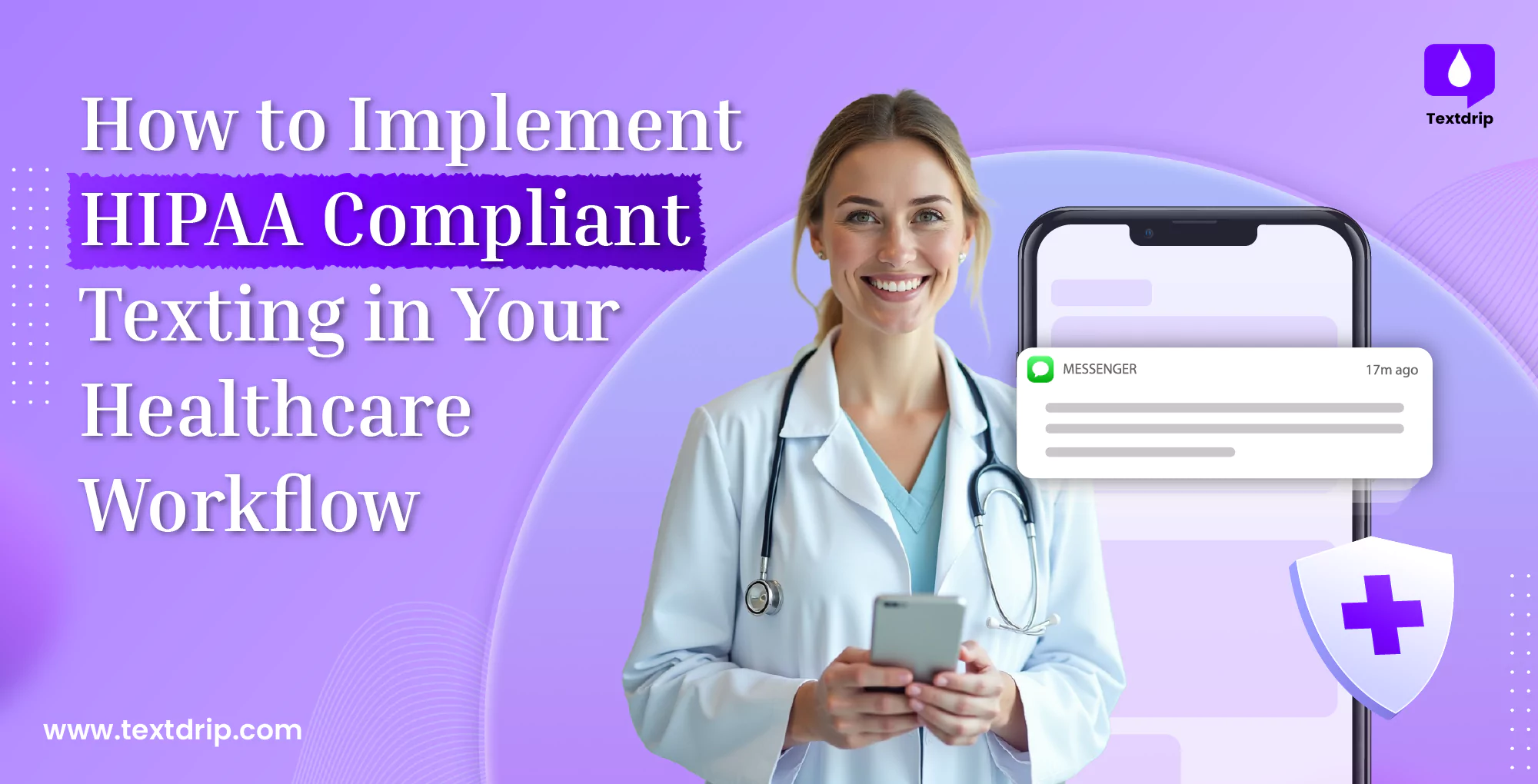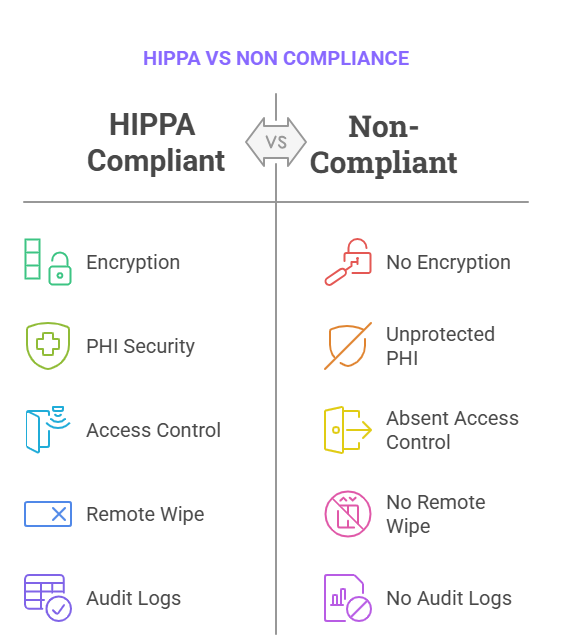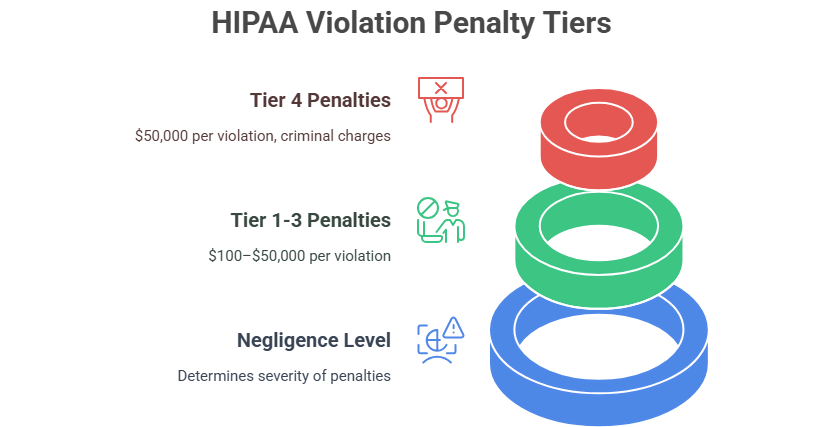29 May 2025
Nicole Esters

29 May 2025
Nicole Esters
The digital-first healthcare environment requires fast and secure communication that functions as a legal requirement. Text messaging has become widely used for healthcare professionals to send appointment reminders and test results as well as care instructions to their patients. The protected health information (PHI) requires messaging platforms which surpass standard text messaging security protocols. HIPAA Compliant Texting represents the solution for this challenge. The article provides complete information about implementing hipaa compliant messaging within healthcare workflows both effectively and lawfully.
Healthcare organizations use secure messaging platforms with encryption for texting according to HIPAA requirements. The platforms maintain PHI confidentiality and provide secure accessibility to authorized personnel.
PHI, or Protected Health Information, is any personal health-related info that can identify someone, like their name, medical records, or treatment details. It’s the kind of stuff doctors, hospitals, insurance companies, or their partners handle when providing care, processing payments, or managing healthcare tasks. Think of it as sensitive data that needs to be kept safe under HIPAA rules.
HIPA compliant messaging includes security features beyond standard SMS because it protects against data interception and unauthorized access. The following features are part of HIPAA compliant messaging:
A physician would use texting to inform his patients about their laboratory test results. Any unauthorized entity that gains access to the phone or the message during transmission would be able to view the sensitive details when using an unprotected platform. A HIPAA compliant solution provides encryption for messages while requiring two-factor authentication through the app and keeps records for auditing purposes.
Healthcare stands as a highly sensitive business sector because HIPAA acts as its fundamental protective measure.
The healthcare industry stands alone because it manages massive amounts of highly sensitive data. Patient data includes information beyond basic contact details because it includes Social Security numbers along with medical diagnoses and lab results and treatment histories. The value of this information to hackers is extremely high and its disclosure would lead to catastrophic consequences.
The Health Insurance Portability and Accountability Act (HIPAA) exists to safeguard sensitive healthcare information. Organizations must adhere to data security standards under this framework while facing consequences for non-compliance. The healthcare industry would face significant risks of security protocol inconsistencies if HIPAA did not exist because millions of patients would be exposed.
The HIPAA compliance process establishes trust between healthcare providers and their patients. Patients will choose to interact with healthcare providers who demonstrate strong privacy measures. Patients tend to reply quickly to doctor messages when they understand that their information remains encrypted through secure protocols.
HIPAA demands healthcare organizations to establish secure text messaging protocols because of its regulatory requirements.
HIPAA regulations demand that all PHI-related communications must maintain both the confidentiality and integrity and availability of patient information. The convenience of text messaging requires specific design elements to achieve HIPAA compliance.
Here’s why secure texting is essential:
The encryption features of traditional SMS are absent which makes it simple to intercept data.
Medical facilities are at risk because devices can be lost or stolen or become targets for hackers.
The lack of access controls allows any person who has access to the phone to view messages.
A nurse delivers medication prescription information to patients through text messages. The loss or theft of a healthcare worker’s phone allows unauthorized users to access sensitive information contained in the device. HIPAA compliant platforms protect sensitive information through their combination of secure login systems and distant wipe capabilities.
The HHS Breach Portal reports various security incidents caused by unsecured communication channels to demonstrate the importance of secure texting practices.


Ready to protect patient data and boost engagement? Switch to HIPAA-compliant messaging with Textdrip today.
Using secure, compliant texting solutions provides multiple advantages to healthcare organizations.
Internal and patient-related processes become faster through operational efficiency. Staff members can use secure real-time communication to plan patient care when they need to.
Through direct mobile delivery, patients receive pre-appointment checklists and follow-up instructions while benefiting from fast and reliable updates.
The commitment to patient privacy through reputation management gives you a competitive advantage in current digital healthcare environments.
HIPAA text messaging guidelines violations lead to multiple serious adverse outcomes. The failure to follow HIPAA guidelines results in both legal consequences and financial penalties and decreased patient trust.
Legal and Financial Penalties
The level of negligence determines the HIPAA violation penalties which exist in different tiers.
Tier 1: $100-$50,000 per violation
Tier 4: $50,000 per violation with potential criminal charges

Other Consequences
Patients have the right to file lawsuits because of data breaches.
The practice license faces suspension or revocation when medical professionals commit repeated violations of regulations.
The disclosure of patient data through a security breach causes both patient distrust and permanent harm to the organization’s reputation. The public and patients would react negatively to unencrypted texting of lab results which would attract media coverage and result in patient backlash.
Select a HIPAA-compliant text messaging platform designed for healthcare settings such as Textdrip. Your chosen system must provide encryption methods along with access controls and audit logs and remote wipe capabilities. The implemented features enable your organization to prevent compliance problems.
Before sending messages containing Protected Health Information (PHI) to patients you must secure their written or digital consent. New patients should sign permission documents that detail the purposes of text-based healthcare communication during their initial registration process.
The messaging platform should be accessible only to staff members who have received authorization. Defining authorized roles and permissions systems helps protect your organization from internal security risks. A front-desk administrative staff member lacks the necessary permissions that clinical nurses or doctors possess.
Your staff members require training about safe handling procedures for protected health information (PHI). Secure text messaging for healthcare scenarios should be included in training sessions to reinforce established policies. Regular training sessions maintain employee awareness about current threats as well as best practices.
The selected communication platform should maintain detailed records of all interactions. Your ability to remain compliant depends on regular audits that reveal potential vulnerabilities in your system. The system tracks message delivery status and access logs so you can respond immediately to detected security issues.
Staff devices must have password protection along with biometric authentication systems that enable remote data wipe operations in case of loss or theft. Device security is strengthened when a protective measure is implemented to counter unauthorized access.
Standard communication is achieved through the use of templates. “This message contains PHI information. Do not forward.” The practice uses this method to set clear expectations and improve security knowledge among staff members.
Here are the main types of HIPAA compliant text messages that healthcare providers, clinics, and other covered entities can send:
Appointment reminder text messages are used to remind patients about their booked appointments not miss them. It helps build relations with patients. Here is an example:
The system sends John a message about his upcoming checkup appointment on March 15 at 10:00 AM. Reply YES to confirm.
After the check-up, it is a good practice to send the prescription to the patients so they do not need to miss it. Here is an example:
The ready prescription for Lipitor is available at your disposal. Get your prescription from your preferred Pharmacist.
Do not let your patients wait for the result of a Test placed before the next level of treatment. Use Test Result Availability text messages like this one:
Your blood test results are now available for viewing. Click the link below to get a complete file for the report.
Connect with your patients with post-procedure follow-up messages that make them feel you care:
The message starts with “Hi Jane” before wishing her good recovery. Contact us when you encounter any discomfort or medication side effects.
Another way of helping your patients is to help them with billing & insurance notifications so that they do not missout on any outstanding. Here is an example:
Your copay amount of $50 remains outstanding. Visit our secure portal to process your payment.
It’s about two or more chronic conditions, so caring is crucial in the management, and sending specific messages makes it easy. Something like:
Mark should check his glucose levels today as a reminder. Our staff needs to receive your blood sugar readings to maintain proper tracking.
The messages distributed through HIPAA-compliant platforms help maintain patient privacy while delivering superior healthcare services.

Don’t risk HIPAA violations – text with confidence using our secure messaging platform designed for healthcare professionals.
As we have understood all the aspects of HIPAA compliant texting, like what it is, its importance, its benefits, and some of the examples of text message templates. Now, if you are someone in the healthcare industry and want to use Textdrip as your text marketing partner, you know what you need to care about as HIPAA Compliant texting.
Secure text messaging for healthcare protects your practice from legal issues and allows you to create stronger patient relationships.
No, traditional SMS is not secure enough for HIPAA text messaging because it lacks encryption and secure user authentication. Healthcare providers must use messaging platforms specifically designed to meet HIPAA standards.
Yes. Any provider of HIPAA text messaging services handling PHI on your behalf must sign a BAA, ensuring they adhere to the same HIPAA standards as your healthcare organization.
Secure text messaging ensures encrypted transmission, while HIPAA compliant texting adds the requirement of adherence to HIPAA rules, such as audit trails, access controls, and formal risk assessments.